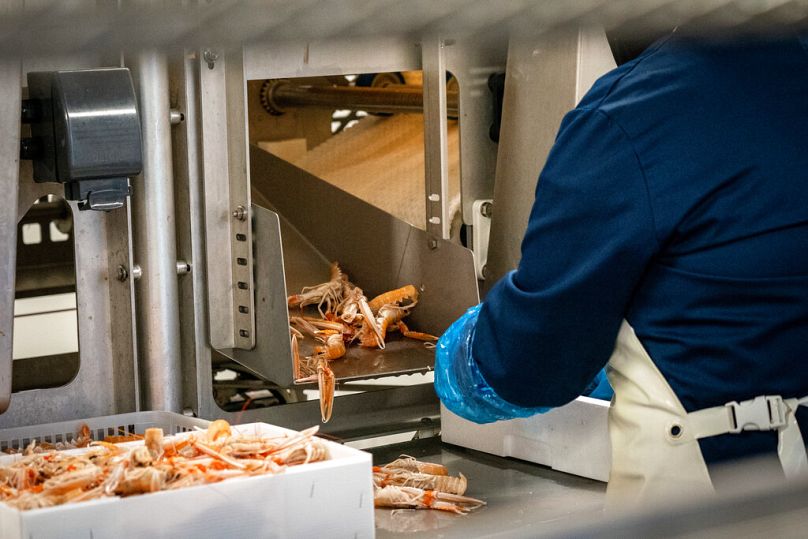An industry that makes up just 0.14% of the UK economy may get sacrificed as part of an EU trade deal.
Areas of the United Kingdom which were built around fishing could find their hopes to rejuvenate their industry are dashed after Brexit.
 ADVERTISEMENT
ADVERTISEMENT
 ADVERTISEMENT
ADVERTISEMENT
Britain’s rural fishing areas voted overwhelmingly in favour of leaving the EU in the referendum of 2016 as they were promised the opportunity to “take back control” of the nation’s fishing.
A poll taken in June 2016 suggested that more than 90 percent of those working in the UK’s fishing industry voted “Leave”.
Much of their resentment towards the EU rests on the Common Fisheries Policy. Although the history of the CFP predates the UK’s ascension to what was then the European Communities, it has become the main focus of anger for fishermen.
British coastline
This policy of managing fish stocks for the European Union has led to considerable restrictions on where and what fishermen can catch.
One of the campaigns in the run-up to the 2016 referendum suggested that Britain could, “regain 70 percent of the UK’s fisheries resources and rejuvenate a multi-billion pound industry.”
But many fishermen are increasingly concerned that attempts to have control of the seas around the British coastline may not be plain sailing.
Not least because the UK government will need to renegotiate a new deal with the rest of the EU over fishing while remaining subject to the CFP until one is agreed.
In a bill introduced to parliament on 29 January, the government has promised to end the automatic right for European fishermen to operate in UK waters, but the EU could well reject such a move.
The small port of Padstow in the south west county of Cornwall is a prime example of a once successful port built around the fishing industry, it is now among the most deprived areas of Britain; with tourism being the biggest contributor to area’s economy.
Average salaries are around €18,000. Considerably less than the national average. But property prices have soared, as tourists from wealthier parts of the UK buy second or retirement properties in the town.
Jason Nicholas has been fishing for shellfish all his working life and is skipper of the boat, the “Levan Mor”. He is keen for the government to deliver on the promises made before and since the referendum but insists that it is not a battle with the French.
“I would like to see all fishermen given the opportunity to make a living, be that French or English,” he said.
“But ultimately we just want to fish, ourselves, out to the 12 mile (20km) limit.”
The area has been identified for so called “Integrated Territorial Investment”, which allows areas in need to combine resources from the European Social Fund, European Regional Development Fund or Cohesion Fund for use in high priority projects. The future of such financial help is uncertain.
The current round of funding is worth €660m. Although some projects will continue until 2023, there is no firm commitment by ministers about what will happen after that.
Regardless of whether Padstow’s economy will survive on tourism or fishing, Jason believes fishing will remain crucial.
“The hardest thing for any of these little villages - these holiday outlets - would be the loss of the fishing industry,” he says.
“It’s what draws people down for holidays. They love to see the boats. They love to see fresh fish, crabs, lobsters being brought ashore.”
Larger ports in the south west, such as Plymouth, provide an intersection between the U.K. and the rest of Europe. The busy fish processing buildings mask the reality that fishing now only makes up 0.14 percent of U.K. economy.
Analysts fear the relatively small size of the industry could mean ministers would sacrifice the wishes of fishermen in favour of bigger businesses.
Marine Consultant, Terri Portmann, believes there is a precedent for selling out on fishing deals. “What this is about is the share that the U.K. fishermen get,” she says.
“That was set when we came into the E.U. by a government that was willing to discount it for other deals and I suspect that’s what’s going to happen on the way out.”
Terri believes the notion of “taking back control” has not been adequately thought out.
“What are they going to do with that control once they’ve got it?” She asks.
“Because if they are simply going to acquiesce to the current arrangements and sharing agreements that are in place, then U.K. fishermen will be no better off.”
“Unfortunately I think fishermen were used as a pawn. They became a poster child for Brexit.”
Leaving the E.U. will not automatically mean fishermen will avoid the C.F.P. entirely. It will also not guarantee benefits for the UK fishing industry. Spain, France and Ireland buy more than 140,000 tonnes of fish from the U.K. These countries also account for 36 per cent of the tonnage exported to Britain’s export markets.
Hopes of a fair-wind by Britain’s fishermen, brought by Brexit, could be short-lived. The U.K.’s coastal waters may be entering some stormy weather.











